Aug 2022 1st edition
Aug 2022 1st edition Londekile
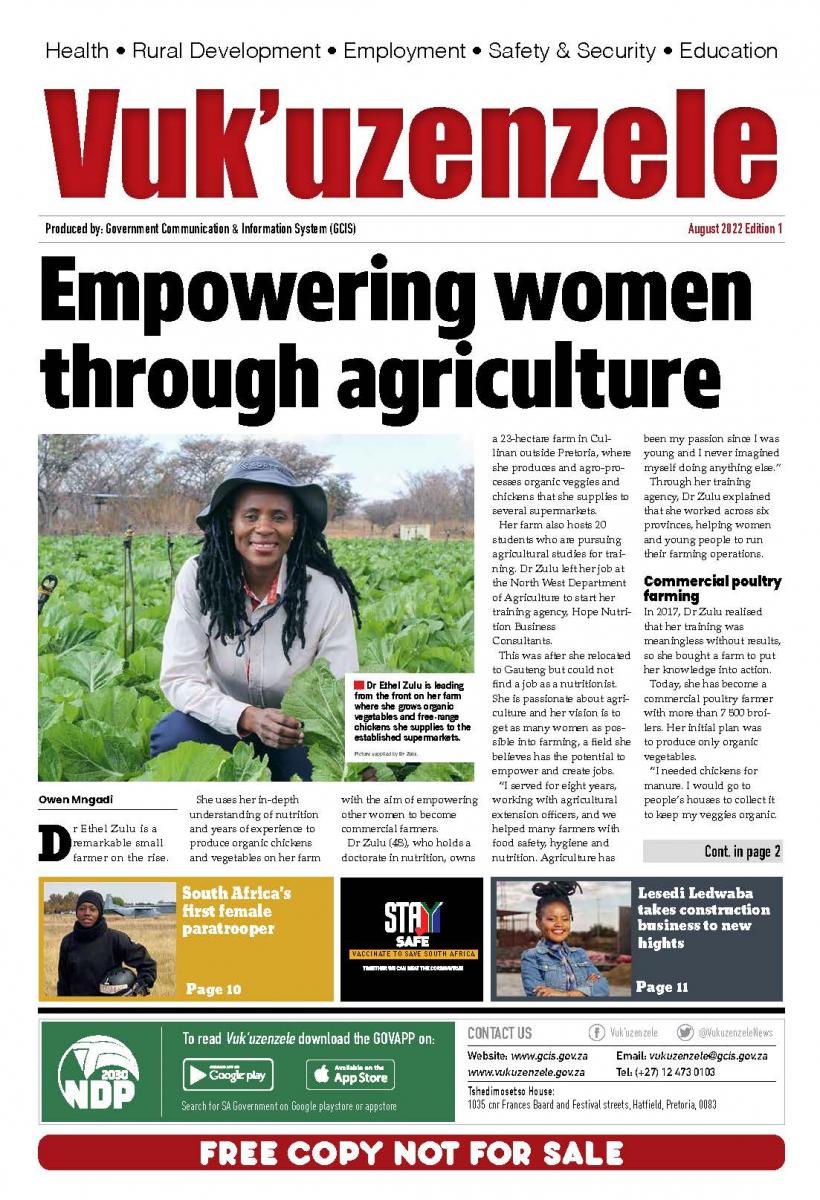
English PDF version
Translations
Afrikaans
isiNdebele
isiXhosa
isiZulu
Sepedi
Sesotho
Setswana
Siswati
Tshivenda
Xitsonga
Apply now to top up Child Support Grant
Apply now to top up Child Support Grant LondekileGuardians of orphaned children urged to seek extra funds through SASSA
Even in the best of times caring for an orphaned child who is eligible for a Child Support Grant as a relative can be costly.
Now, relatives or guardians of orphaned children can apply for a 50% top-up to the grant to ease the financial pressure.
The Department of Social Development urges relatives taking care of orphaned children to apply for a top-up grant through the South African Social Security Agency (SASSA).
The basic child support grant is R480, but successful applicants can get an additional amount of R240, bringing the total amount to R720 per month. The child support grant is currently being received by more than 13 million children in South Africa.
“This is not a new grant but rather builds on the existing child support grant system in a form of a ‘top-up’ amount,” says the department.
This provision will lessen the number of children taken to foster care homes. Relatives caring for orphaned children can get the grant quickly by going directly to SASSA without first needing a social worker’s investigation, report and a court order.
The top-up intervention came into effect when the department gazetted the proclamation of the Social Assistance Amendment Act on 30 May 2022 to benefit orphans and vulnerable children.
“The child support grant top-up lessens the burden on social workers dealing with high foster care cases by reducing the number of new applications and two-yearly extensions,” says the department.
This will also free up social workers to provide responsive child protection and care services to all children in need of care and protection.
The top-up intervention is also meant for orphaned children living in child-headed households. The extra money should be used to provide for the children’s basic needs.
To receive this benefit, applicants will be required to prove that a child is an orphan by providing certified copies of the death certificates of the child’s parent(s).
“Where the death certificate of one of the parents of the child cannot be obtained by the applicant, a certified copy of the death certificate of one parent and an affidavit by the applicant attesting to the unknown status of the child’s other parent,” says the department.
To apply, you can visit the nearest SASSA office. For more information, you can email GrantsEnquiries@sassa.gov.za or call SASSA Services on 0800601011 or 0124002322
Bricklaying no longer a man’s job
Bricklaying no longer a man’s job LondekileThe future looks bright for Pretty Khumalo (29) from Mpumalanga, who recently qualified as a bricklayer.
Khumalo saw an advert on social media and grabbed the opportunity to make her dream of becoming a qualified bricklayer come true.
She started a learnership as part of the Artisan Development Programme, which covers trades including electrical, bricklaying and plumbing.
The programme is part of the Department of Public Works and Infrastructure’s Expanded Public Works Programme (EPWP).
Armed with her bricklaying certificate, Khumalo says that South Africa needs more women artisans and is determined to make her mark in the male-dominated bricklaying industry.
“Bricklaying is not only about laying bricks, one can also work as an inspector and do other things,” she said.
“I have always believed in myself, that I can do anything that men do.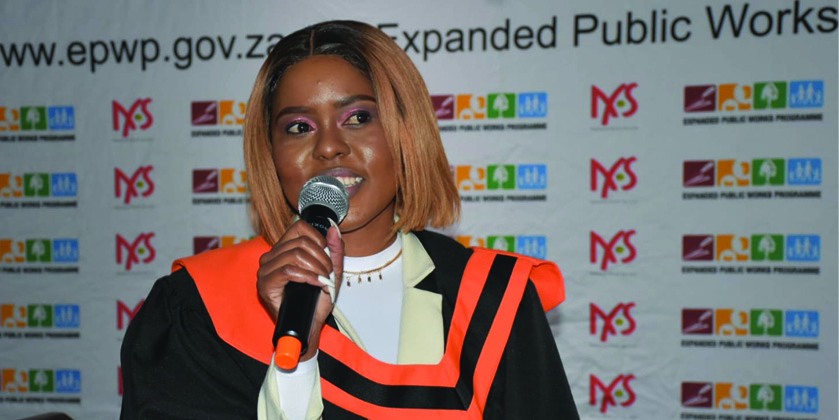
I believe women are capable of doing what men do; they should start dominating the men’s world,” says Khumalo.
“What men can do, women can do too; they can do it far much better than men. Women need to believe in themselves and have confidence.”
Khumalo, who lives in Pretoria, plans to start her own construction company.
She was among the 37 graduates who completed their three-year training. During the training, the participants received a monthly stipend of R3 000.
The EPWP, through the National Youth Service (NYS) office, recruited participants who showed an interest in the programme during the first phase of their NYS training.
These participants were upgraded and placed in the Artisan Development Programme, which is fully funded by the NYS.
Public Works and Infrastructure Deputy Minister Noxolo Kiviet, who officiated the graduation ceremony, expressed her pride and encouraged the young graduates to look for employment in the formal sector.
“I am strongly convinced that you will live up to your calling as artisans in various fields of the built environment to the very best of your abilities,” said Kiviet.
She said the Artisan Development Programme is a key government initiative aimed at affording the youth better employment prospects.
“It is important to note that the EPWP plays a critical role in the workforce and in the provision of scarce and critical skills in South Africa,” the deputy minister said.
Bridging the gender gap in tech and science
Bridging the gender gap in tech and science vuyelwanFive years ago, #CodeLikeAGirl was launched to equip young girls with skills and bridge the gender disparity in technology in South Africa.
Sponsored by Vodacom, the initiative encourages young girls to explore Science, Technology, Engineering, and Mathematics (STEM) careers.
The programme was launched in 2017 in Tembisa, east of Johannesburg, with only 20 girls. Today, Vodacom seeks to train 1 500 young girls in coding this financial year, bringing the total number of girls trained to 4 000.
This year, Vodacom celebrates five years of this programme, which has expanded to Mozambique, Tanzania, Democratic Republic of Congo and Lesotho. 
Speaking at the five-year celebration event, Njabulo Mashigo, Human Resources Director for Vodacom South Africa, said: “The gender disparity in STEM is alarming, especially since these are the jobs of the future. By teaching high school girls how to code, we’re opening their eyes to sequential thinking around problem-solving and stimulating creativity and design skills.”
Coding is the process of transforming ideas, solution, and instructions into the language that the computer can understand. Coding is how humans talk to computers to get the output they want.
Some alumni shared how #CodeLikeAGirl has positively influenced them and boosted their confidence.
Saabrerah Salie (19) coded an epilepsy detector. Chimwemwe Mwansa (18), Shreya Rupan (19) and Zainaaz Hansa (18) have each coded their own websites.
Hansa programmed past papers for all grades and all subjects. “I created an app for the same thing,” said Hansa.
The young ladies believe these coding programmes are important for the job market, especially as society moves towards the Fifth Industrial Revolution in which automation will continue at an accelerated pace.
Hansa added that the programme was important because it empowered young girls and made them financially independent, meaning they could live as they choose and leave abusive relationships.
All the girls agreed that women can play any role in the IT and engineering spaces and that anything a man could do; they could do, too.
The #CodeLikeAGirl programme takes place during the school holidays for two weeks.
If you are interested in applying for this programme, you must have an interest in STEM subjects and/or careers. The programme is open to girls between ages 14 and 18 years from both public and private schools. For more information visit https://www.vodacom.com/vodacom-foundation.php or follow Vodacom on its social media handles for more information on the #CodeLikeAGirl programme.
Emelita Nyalungu rides the radio airwaves
Emelita Nyalungu rides the radio airwaves LondekileBushbuckridge Community Radio in Mpumalanga has given Emelita Nyalungu (33) a chance at a better life.
Nyalungu, who is a news reader and current affairs presenter, started at the station as an intern and gradually worked her way up to her current position.
“I was informed by a security guard who used to work at the gate about the audition at the station. I passed the audition. Even though I did not know radio, I had a golden voice and the drive to help me stand out among others,” she said.
Nyalungu was raised by a single mother who survived by selling fruit and vegetables. Finding employment at the station has allowed her to further her studies and she holds a Diploma in Banking management from Central College.
“Now I’m busy studying Public Relations Management at Bushbuckridge College.”
Station manager Caroline Kintu says her journey was similar to Nyalungu’s. She started working at the station in 1996 as a presenter before becoming an admin programme manager and was recently appointed to her current position.
“It is still important for women to take part in this sector because they represent other women in the media industry. Women need to support each other and fight for economic freedom and inequality. As women, we must lead, educate and resolve the challenges we face. I believe in the phrase which says when you strike a woman, you strike a rock.”
The station was recently unveiled as a state-of-the-art studio funded by the Media Development and Diversity Agency (MDDA). Deputy Minister in The Presidency, Thembi Siweya encouraged board members and the community of Bushbuckridge to take care of the equipment, as it takes 10 years for the MDDA to provide funds for new equipment.
We want this community radio to continue to play a big role in social cohesion and service delivery,” said the Deputy Minister.
The new studios allow Bushbuckridge Community Radio to audio stream, which will elevate the quality of broadcasting, opening more areas to the content about community activities and pride in local cultures.
Kintu said the station had so far groomed 18 staff members who have since moved to different radio stations, including Ligwalagwala, Thobela FM, Capricorn and Mungana Lonene.
For more information about the MDDA, visit www.mdda.org.za
Empowering women through agriculture
Empowering women through agriculture vuyelwanDr Ethel Zulu is a remarkable small farmer on the rise.
She uses her in-depth understanding of nutrition and years of experience to produce organic chickens and vegetables on her farm with the aim of empowering other women to become commercial farmers.
Dr Zulu (48), who holds a doctorate in nutrition, owns a 23-hectare farm in Cullinan outside Pretoria, where she produces and agro-processes organic veggies and chickens that she supplies to several supermarkets.
Her farm also hosts 20 students who are pursuing agricultural studies for training. Dr Zulu left her job at the North West Department of Agriculture to start her training agency, Hope Nutrition Business Consultants.
This was after she relocated to Gauteng but could not find a job as a nutritionist. She is passionate about agriculture and her vision is to get as many women as possible into farming, a field she believes has the potential to empower and create jobs.
“I served for eight years, working with agricultural extension officers, and we helped many farmers with food safety, hygiene and nutrition. Agriculture has been my passion since I was young and I never imagined myself doing anything else.”
Through her training agency, Dr Zulu explained that she worked across six provinces, helping women and young people to run their farming operations.
Commercial poultry farming
In 2017, Dr Zulu realised that her training was meaningless without results, so she bought a farm to put her knowledge into action.
Today, she has become a commercial poultry farmer with more than 7 500 broilers. Her initial plan was to produce only organic vegetables.
“I needed chickens for manure. I would go to people’s houses to collect it to keep my veggies organic. That is how the idea of the broilers came about. Within two years, we produced 5 000 broilers and started to supply local super-markets.”
She added that her chicken are free-range and organic, with zero hormones. She uses chicken manure to grow vegetables such as spinach, broccoli, cabbage and peppers.
In addition to supermarkets, Dr Zulu supplies her produce to hawkers. Her operation is so successful that she employs 12 women permanently.
According to Dr Zulu, poultry is the most critical sector in the country, as most families consume chicken more than any other kind of meat.
Dr Zulu has hopes of training more than 1 000 women in farming across the country each year. She is also set on being one of South Africa’s trusted producers of free-range chickens and organic vegetables.
She advises aspiring female farmers to start small and not wait for government support. “When government support finds you, it will be a boost. If you need to produce 3 000 broilers, nothing stops you from starting with 20. Approach local supermarkets to get their specifications on the quality they want and work in groups so that you can meet their quality and quantity demands,” she adds.
Empowering women through agriculture
Dr Zulu believes agriculture can play a role in empowering women economically and creating more jobs for women.
“If you empower a woman, you empower the nation. We are able to share our knowledge and get more people involved.”
She adds that women do not have to limit themselves to primary agriculture but need to explore other aspects of the industry such as agro-processing, packaging and reselling.
“Financial independence is the only thing that can help us end the scourge of gender-based violence and that can be achieved through farming, among other things,” said Dr Zulu.
Forest beneficiation key to combating climate change
Forest beneficiation key to combating climate change LondekileTrees, more especially forests play a significant role in climate change as both of these are inexplicably linked together. Research by the Nature Climate Change found that the world’s forests provide a “carbon sink” that absorbs 7.6 billion metric tonnes of carbon dioxide per year. These trees are able to absorb carbon dioxide when standing or regrowing and thus help reduce greenhouse gases. However, when the trees are cut down or deforestation happens, all of this carbon is released back into the atmosphere.
This is why historic plantation transfers back to the community that the Deputy Minister of Forestry, Fisheries and the Environment led on 30 June 2022 in the Eastern Cape are so important. Working with communities ensures that deforestation does not happen as communities are taught to harvest trees sustainably which also ensures that forests and plantations are able to help fight climate change.
The transfer of these plantations comes after the Makhoba Traditional Council and Batlokoa Traditional Council made an offer to enter into a Community Forestry Agreement (CFA) in terms of Section 29 of the National Forests Act, 1998 (Act 04 of 1998). The Makhoba community and Fort Usher and Lehana communities represented by the Makhoba Traditional Council and Batlokoa Traditional Council respectively are now the managers of the Makhoba plantation, Fort Usher plantation and Lehana plantation all with the combined size of approximately 363,31 hectares.
Part of the transfer includes continued support by the Department to the communities to help them manage the plantations. This support will include offering the communities capacity building interventions, linking communities with strategic partners, providing seedlings and educating communities on sustainable harvesting as well as the importance of the plantation on climate change.
Deputy Minister also planted trees at the Batlokoa Royal Place in Mount Fletcher in the Eastern Cape as part of the ten million trees programme, to signify the future growth of the plantations, the communities and to also signify the importance of trees in the plantation in the fight against climate change.
By transferring the plantations into the management of the community dependent on them, this allows the community to take fully responsibility of their environment. The plantations in the Eastern Cape have become woodlots which have been mismanaged with the dangers of deforestation looming. However, working with the Department, the communities will receive amble support and guidance on how to better manage the plantations for the well-being of the community and for the mitigation of climate change.
For years researchers and scientists have warned governments, politicians, industries and society as a whole about climate change and today, the environmental warnings of rising temperatures, extreme weather phenomena and more are being experienced all over the world including South Africa.
Some of the effects of climate change felt around the country in recent months include the recent floods which greatly affected the KwaZulu-Natal province as these floods damaged infrastructure, property and displaced thousands of people in the province. While other provinces such as the Northern Cape, Free State and Eastern Cape have been experiencing droughts with the Western Cape also seeing an increase in wildfires.
Trees are able to absorb carbon dioxide through their leaves through the process of photosynthesis. Researchers have found that more trees are able to absorb more carbon however the cutting or burning of these trees releases the stores carbon back into the atmosphere further contributing to climate change.
The South African government through the Department of Forestry, Fisheries and the Environment has committed to the 10 Million Trees Programme which is a project that aims to plant at least two million trees each year, for the next five years. This programme is a national call from the Presidency of the Republic of South Africa with the aim of attaining environmental sustainability and protection, and to realise socio-economic benefits for South Africans. The Department is calling on members of society, the private sector, government organizations, non-government organizations, schools as well as community based organizations take part in the planting of the Ten Million Trees by celebrating each milestone with a tree planting for the next five years.
Former car mechanic turns into burger king
Former car mechanic turns into burger king LondekileAfter a two-year mechanic contract ended, Tiyani Maluleke from Soweto dusted himself off and is now on the road to building a food-on-wheels empire.
The food enthusiast says he started the business after losing a car-servicing contract along with another failed business venture in manufacturing.
After four months with no income, he was dejected and ready to pack his bags and relocate to the North West when his friends convinced him otherwise.
The initial plan was to move to the North West to open a food joint.
“I had a challenge of opening a joint that side because I did not have enough money. A friend of mine told me to just start, and lended me a deep fryer...”
This saw the birth of Grub Worx.
The 27-year-old Maluleke says: “I started with nothing ... I decided to build myself a push-mobile cart. I went around the yard, cut up some metal and started constructing it.”
During the construction phase he realised that the cart would be too heavy. That’s when his mechanical skills came to good use. “At that time I had a really old VW bakkie shell. I dipped into my credit card to turn the bakkie into a grub truck.”
He says his ultimate goal is to expand the business to a fleet. “I want to see myself owning a lot more (trucks) and doing a whole lot more bookings. I want to be an exclusive mobile burger joint. I serve gourmet food, and not your ordinary street food,” he says.
His passion for good food fuelled his entrepreneurial spirit to start a mobile eatery business.
“I love good food. I just love burgers but I don’t think we are consuming them the right way. I use fresh meat and fresh vegetables with a lifespan of two to three days.”
Before venturing into the food business, he manufactured cleaning products, but abandoned the initiative when the market became saturated.
Free online learning for high school learners
Free online learning for high school learners LondekileLearners between Grade 8 and 12 should take advantage of the University of Pretoria’s (UP) free online learning content for maths, physical sciences, accounting, life sciences, natural sciences and English.
The team behind UP’s free JuniorTukkie programme saw the outbreak of the coronavirus (COVID-19) as an opportunity to support even more learners with their schoolwork and career choices.
The programme, which has been run by the UP’s Department of Enrolment and Student Administration since 2012, used to host regular events to empower prospective university students to make wise study and career choices and be better prepared for their exams.
Pre-COVID-19, the programme assisted about 300 matriculants a year. When the events could no longer be held due to the pandemic, UP took the programme online. In July 2020, the JuniorTukkie YouTube channel was launched, followed by the launch of e-learning platform jTOnline in 2021. Within six months, the platforms recorded 100 000 views.
Fortune Thobejane, a Grade 12 learner from Mphela’ A Marumo Secondary School in Apel Village, Limpopo, says jTOnline is helping her to make informed study and career choices.
“jTOnline’s e-learning material on accounting, mathematics, physical sciences, English and life sciences is beneficial in my comprehension of the subjects’ content,” says Thobejane.
She is part of Kodumela Bokamoso Youth Development, a non-profit organisation established to respond to the growing need to develop leaders within rural communities.
“We’ve already uploaded nearly 1 000 educational videos, all developed by skilled and experienced teaching professional. Although challenging at times, it’s been nothing short of exciting and rewarding,” says Dr Petrus Lombard, Manager: JuniorTukkie and Undergraduate Recruitment.
The broadcasts are available on YouTube (@JuniorTukkie at the University of Pretoria) and can also be accessed from jTOnline at https://juniortukkie.online.
Register for jTOnline
To register as a jTOnline user and be notified as new learning content is uploaded, follow these steps:
In your internet browser, type: juniortukkie.online.
Complete the jTOnline registration form and create a password.
Choose the classrooms you want access to and click “submit”.
Go back to juniortukkie.online and click on “login”.
For more information, visit https://juniortukkie.online.
Health sector congratulates 594 medical graduates trained in Cuba
Health sector congratulates 594 medical graduates trained in Cuba LondekileMore than 500 South African medical students who recently graduated from Cuban universities are expected to help address challenges that continue to plague the country’s health care system.
The 594 South African medical graduates were part of the Nelson Mandela/Fidel Castro Medical Collaboration Programme. The graduation ceremony took place at the University of Pretoria’s Mamelodi campus.
The objective of the programme is to alleviate the shortage of doctors in South Africa, especially in the historically disadvantaged communities, as well as to improve human resource capacity and strengthen the healthcare system in the country.
Health Minister Dr Joe Phaahla says the programme opened access to advanced training in the medical profession for disadvantaged students who would otherwise not be admitted in most of the South African medical schools because of their socio-economic background.
“The demand of doctors and other healthcare workers remains a huge issue in South Africa’s health care system. The system and our conditions as a country require those trained in the new health associated security paradigm and preventative approach to strengthen the primary health care system,” the minister says.
From 1997 to date, the collaboration has produced 2 556 doctors, some of whom have become specialists.
Annually, since 2018, it has been producing more than 600 doctors, a milestone that exceeds South Africa’s local production of medical doctors.
Minister Phaahla was joined by Health Deputy Minister Dr Sibongiseni Dhlomo, Deputy Minister of Health in the Republic of Cuba Dr Luis Fernando LF Navarro, the acting vice chancellor and principal of the University of Pretoria, Prof BT Maharaj; as well as provincial MECs for health and representatives from the University of Havana in Cuba.
This group of doctors come from eight different provinces, with North West and KwaZulu-Natal having 126 graduates, Gauteng 113, Limpopo 86, Eastern Cape 83, Northern Cape 28, Free State 21, and Mpumalanga 12 graduates.
“The current socio-economic conditions and environmental factors in South Africa requires the health sector to remain vigilant and maintain focus on infectious diseases as they have been shown to be the emerging threats,” says the minister.
Part of the benefits that come with the programme is that the South Africa-Cuba universities collaboration in the academic discipline, especially in health, involves the sharing of information and exchanges in research.
“When the graduates return home, they get integrated into the South African medical schools for quality assurance of their qualifications,” the minister explains.
Afterwards, they get offered places in the internship and community service programmes.
– SAnews.gov.za
How GBV changed my life
How GBV changed my life LondekileSibongile Raphagadi (41, not her real name*) has always struggled with her sexuality.
Raphagadi says she knew as early as primary school that she was different.
“When my classmates would be excited about speaking to boys or being asked to go on dates, I had no such feelings. Instead, I started realising that I had a lot more in common with the boys in my class and neighbourhood than the girls.”
Growing up in a staunch Christian home made it difficult for her to express her feelings openly with family members.
“My mother was never open to the idea of homosexuality. When I became a teenager, I found myself almost forced to date guys because it was expected of me,” she says.
It was only in 2000 that she gathered the courage to speak out about her sexuality to those around her.
“One day in December 2000, while I was out with my female friends, a bunch of guys approached us and started grabbing two of the girls. I, of course, interjected and was insulted and physically assaulted.”
During the altercation, one of the guys said he wanted to prove she could never be a man while stomping on her face. As a result, she lost sight in her right eye.
“I knew the attack was not just about the girls, but was more about me being lesbian and them thinking I had free access to women and taking the ladies away from them.”
After the incident, Raphagadi and her family sought counselling.
“We had therapy sessions with the organisation OUT and I was able to heal over the trauma and anxiety that the crime had caused me.”
She had to accept her new reality as a partially blind person.
“The sessions also helped my family to voice their concerns and get further understanding on my sexuality. Therapy proved to be a healer and I would strongly advise others to explore this route.”
OUT is a Pretoria-based non-governmental organisation that provides direct health services to the LGBTQI community.
“We are all wholesome women despite our sexual preferences. This Women’s Day, I would like to encourage South Africans to do better in respecting women from the LGBTQI commun-
ity,” Raphagadi says.
Did you know?
- The Sexual Offences and Related Matters Amendment Bill, the Criminal and Related Matters Amendment Bill, and the Domestic Violence Amendment Bill were officially signed into law in 2022.
- Under these new laws, it is compulsory for all convicted sexual offenders to be listed on the National Sexual Offenders Register.
- The new law also states that the definition of domestic violence has also changed to include victims of assault in those engaged to be married, people who are dating, customary relationships, and those in actual or perceived romantic, intimate, or sexual relationships of any duration.
If you need help, contact the following organisations:
OUT Organisation - www.out.org.za, 012 430 3272 / 066 190 5812 email: hello@out.org.za
The gender-based violence command centre 0800 428 428 or send (PLEASE CALL ME) to *120* 7867#
How Legal Ombud fights for your rights
How Legal Ombud fights for your rights LondekileIndependent body seeks to address injustices within the legal profession so that all citizens are treated ethically
Should you be a victim of corrupt lawyers or experience any other form of legal malpractice, you can lodge a complaint with South Africa’s Legal Services Ombudsman.
In 2020, President Cyril Ramaphosa appointed Justice Sirajudien Desai as the Legal Services Ombud in terms of Section 47 of the Legal Practice Act No. 28 of 2014.
The Act empowers Judge Desai to investigate complaints and alleged maladministration in order to take action against conduct that may affect the integrity of the legal the profession.
The Minister of Justice and Correctional Services, Ronald Lamola says the Legal Services Ombud will address systemic injustices within the legal profession, foster accountability and provide redress.
“Our people have a right to be treated with respect and integrity,” says Minister Lamola.
He says common problems of misrepresentations include lawyers robbing clients of payouts from the Road Accident Fund, lawyers conspiring with each other at the expense of their clients, and being dishonest and incompetent.
Head of Legal and Investigation at the Office of the Legal Ombud, Godfrey Ramoroka says no person may interfere with the functioning of the Ombud since it is an independent body.
The objectives of the Ombud are to:
- Protect and promote the public interest in relation to the rendering of legal services.
- Ensure fair, efficient and effective investigation of complaints of alleged misconduct against legal practitioners.
- Promote high standards of integrity in the legal profession.
- Promote the independence of the legal profession.
How to lodge a complaint
If you want to lodge a complaint with the legal ombud you can either call, email or use social media.
“Once the complaint has been received, we forward it to the assessment office, which allocates files accordingly and assesses the merits of the complaint in line with our office’s mandate. The next step is to verify assessment,” Ramoroka says.
Once the investigative merit is granted, the complaint will be assigned to an investigation office. If it has no merit, advice will be provided to the client with possible alternatives.
Thereafter, the investigation office will investigate the complaint and send a report to an evaluation committee, which will decide if mediation, conciliation or negotiation is required.
You can email complaints to: TLegora@justice.gov.za or call 076 235 9887, 010 023 5501 or 012 023 5505, or directly send a message using Twitter: @OLSO or Facebook: Office of Legal Services Ombud
Immunise your children
Immunise your children vuyelwanParents and guardians need to ensure that their children’s vaccinations against measles and other preventable diseases are up to date.
The National Institute for Communicable Diseases recently reported confirmed cases of measles in the country.
Sonia Botha, Western Cape coordinator of the Expanded Programme on Immunisation (EPI), has encouraged caregivers to ensure that children are protected against measles and other vaccine-preventable diseases. 
“Measles is preventable through a safe and effective vaccine, accessible for free at public health facilities and at a minimal cost from public-private partners.”
Measles signs and symptoms
Measles is a highly contagious, serious disease caused by a virus that is normally passed through direct contact and through the air. The virus infects the respiratory tract and then spreads throughout the body.
The measles virus also weakens the immune system and makes a child more vulnerable to other infectious diseases such as pneumonia and diarrhoea.
Signs and symptoms of the disease include:
- A high fever, which begins about 10 to 12 days after exposure to the virus and lasts four to seven days.
- A runny nose, a cough, red and watery eyes and small white spots
inside the cheeks can develop in the initial stage. - After several days, a rash erupts, usually on the face and upper neck. After about three days, the rash spreads, eventually reaching the hands and feet. The rash lasts for five to six days, and then fades. On average, the rash occurs 14 days after exposure to the virus.
Serious measles complications are more common in children under the age of five or adults over the age of 30. The most serious complications include blindness, encephalitis (an infection that causes brain swelling), severe diarrhoea and related dehydration, ear infections and severe respiratory infections such as pneumonia. Severe measles is more prevalent among poorly nourished young children, especially those with insufficient vitamin A, or whose immune systems have been weakened by HIV/AIDS or other diseases.
How you can protect your children
Check your child’s Road to Health booklet, provided by your local clinic, to ensure that your child has received all their immunisations at the clinic or healthcare provider. In South Africa, children are given measles immunisation at six months and again at 12 months. If you have questions about your child’s immunisation schedule, talk to your health practitioner at your local clinic.
This information was supplied by the Western Cape Department of Health
Lesedi Ledwaba takes construction business to new heights
Lesedi Ledwaba takes construction business to new heights LondekileWhen Lesedi Ledwaba (33) took over her family’s brick and stepping stone manufacturing business from her father in 2011, she didn’t anticipate that she would love the construction industry.
Ledwaba, who holds a public relations diploma from Varsity College in Pretoria, is the owner and chief executive officer of 16eTona Sand and Bricks in Garankuwa, Gauteng.
She says her journey started in her early 20s, when her father taught her entrepreneurship.
“In 2011, I was an unemployed graduate. My father, Phillip Ledwaba, asked me to come work with him. Through his guidance and patience, I eventually grasped the business ideologies of the construction business.”
Ten years later, Ledwaba is leading the company that boasts 14 employees. Her main tasks include overseeing daily targets, marketing and client service.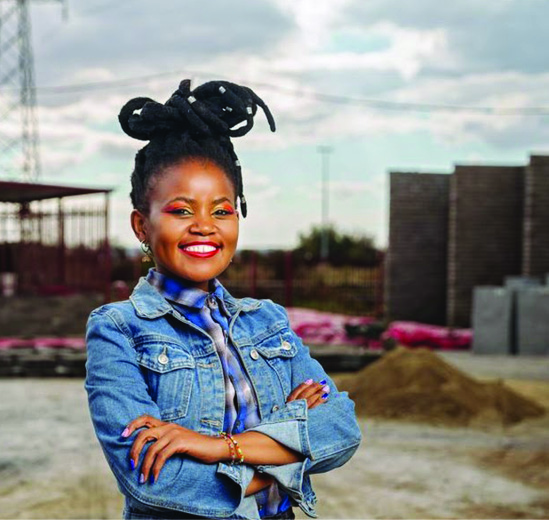
Through her hard work, Ledwaba has grown 16eTona into a thriving business and has expanded it to be the only business that is manufacturing slab blocks in Garankuwa.
Slab blocks are a combination of concrete hollow blocks and concrete bricks that are used for multi-storey buildings.
In 2020, she further secured sponsorship for a brick-making machine that makes 6 000 maxi bricks a day from PPC Cement in Pretoria.
Ledwaba, however, acknowledges that it was not easy for her to break into the male-dominated industry as a young woman.
“It has been a long and hard road to gain the trust of my clients and sometimes men generally don’t take women seriously.
I want to change that narrative and hopefully show other girls in my community that through hard work and consistency, dreams do come true.
I also want to show them that not getting the job you studied for is not the end of the road for you.”
Ledwaba says women have a lot to offer to the business world and should not doubt themselves.
“Women have a unique ability to be consistent and professional in the work that they do. If more women joined this industry, they could be able to support their children and even build legacies for them,” says Ledwaba.
For more information about 16eTona Sand and Bricks, call 072 303 3930 or email 16etona.bricks@gmail.com
Limpopo entrepreneurs climb events industry ladder
Limpopo entrepreneurs climb events industry ladder LondekileLisbeth Makgoro and Sonia Mashego, both 28, are well on their way to making a mark in the entertainment and events industry in their hometown of Groblersdal, Limpopo.
In 2018, the two entrepreneurs founded LSD Flexi, an events company that offers services such as party décor and jumping castles, and caters to community members, schools and church events.
Makgoro and Mashego started the business after being unemployed for more than a year.
“After more than a year of unsuccessful job hunting, we figured we needed to get ourselves busy. We saw a gap in entertainment facilities in our home town,” says Mashego.
The initial plan was to open a games and entertainment centre at a local mall, but they soon realised that such a move would require too much money. So, they chose to start a small events company instead.
While searching the internet for funding opportunities from government institutions, they came across the National Youth Development Agency’s (NYDA) website.
“Luckily, that same year an NYDA office was launching in Groblersdal, and that gave us easy access to information,” says Mashego.
Through the NYDA funding, they bought two jumping castles and décor pieces for their events.
Like any other business, Makgoro and Mashego have faced a few challenges such as hosting fewer events in winter and in rainy season, difficult-to-fulfil briefs from clients and the slippery navigation of lockdown and post-lockdown regulations.
As a solution, Makgoro and Mashego decided to host events indoors and worked closely with clients to figure out the essential elements that can make an event successful without wasting resources. They also run special offers to compete against other event management companies. Social media is an important marketing tool for the business.
“Social media has given us the opportunity to connect with our fans and followers. We always keep our posts entertaining and informative,” says Makgoro.
LSD Flexi has one full-time assistant and two part-time ones
For more information on the NYDA, visit their website at http://www.nyda.gov.za/ or contact them on 087 158 6345 / 5738. Alternatively you can send an email to info@nyda.gov.za
Mentorship programme adds sizzle to food
Mentorship programme adds sizzle to food LondekileA food lab incubator programme that mentors small businesses is opening doors to more women in the restaurant industry and helps to create jobs.
The National Treasury Job Fund initiative is run in collaboration with the V&A Waterfront in Cape Town.
Twenty small businesses enrolled in the five-month mentorship programme and participating businesses were given space at the Makers Landing within Cape Town Cruise Terminal. Total financial support from the Job Fund and V&A is totalling R63 million.
Makers Landing is an industrial, repurposed space within the terminal for food traders to market and sell their cuisine.
The programme offered kitchen incubator space, where local food entrepreneurs could innovate, learn and grow their businesses within the local food community.
Aneeqa Sadan, owner of Cookie Jar Co, which specialises in cakes, says the finances of her business have improved since enrolling in the programme.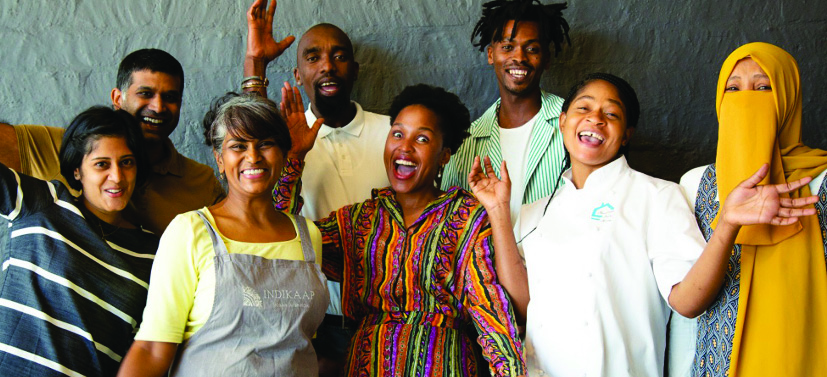
“I have learned to manage the finances of my business better and how to make the most out of my social media platforms and use it to maximise advertising for my business,” she says.
Nabo Binase and Lipato Shogole co-own the African-inspired Ukutya Restaurant. The programme has helped them improve their record-keeping and operational systems.
“We have learned the importance of data collection and having systems in place to ensure smooth operations. We are developing a website. We have now also started to record our sales and to record our business data such as customer lists and prospective collaborators, budgets and plans.”
Najwah Allies-Edries, head of the Jobs Fund, says the V&A Waterfront provides a perfect environment for caterers, local producers and quality food start-ups to grow their businesses efficiently and easily under the guidance of seasoned professionals in an already highly successful commercial space.
“A partnership like this demonstrates the immeasurable value of assembling the right partnership ecosystem, skills, and resources,” Allies-Edries says.
David Green, V&A Waterfront CEO, says beyond showcasing South Africa’s incredible variety of cultural dishes and foods, the programme helps to nurture and grow small businesses whose operators gain “first-hand knowledge by working alongside experienced players”.
Jobs Fund co-finances projects by public, private, and non-governmental organisations to contribute to job creation. It allocates grant funding through a competitive, one stage process. All applications must be submitted online using the following link: https://jobsfund.praxisgms.co.za
More investment in female farmers
More investment in female farmers vuyelwanNomalanga Sibinda (21) from Pudumong village, just outside Taung, North West, is a proud graduate who holds a Diploma of Agriculture in Irrigation from Taung College of Agriculture.
Sibinda is one of nine students who were supported through a bursary programme that was started in 2019 by North West Agriculture and Rural Development MEC, Desbo Mohono. The students received financial support to complete their three-year diploma, setting them on the path to become serious agribusiness operators.
MEC Mohono started the agricultural initiative to support young people interested in agriculture but with no financial means to pursue their studies. The bursary is offered through her office. 
Sibinda is grateful that the bursary allowed her further education, something she had never dreamed of.
“I was raised by my grandmother, who was self-employed and could not do much but provide for the basics. The idea of further education was not even on my mind.”
Her high school agriculture teacher advised her to apply for the bursary.
“I applied and I was fortunate to be accepted. Even though I didn’t really consider a career in agriculture, this opportunity widened my eyes to the prospect.”
Sibinda is thrilled that many young people are modernising the agricultural sector, thereby creating interest about agriculture among their peers, especially women.
“I would like to continue studying and acquire another qualification in environmental studies. I also wish to start my own farm to help employ and groom young upcoming farmers.”
She urges other women to take up agriculture, even though it is still a male-dominated industry.
“We all know men dominate this sector, but we are on our way to take up our space. The aim is to chin up, walk tall and make the most of our inabilities seen and made able by ourselves,” Sibinda says.
Addressing the graduates, Mohono said: “These young people have managed to grab the opportunity and have completed their diploma in record time.
Multi-million waste fleet to wrestle municipal litter
Multi-million waste fleet to wrestle municipal litter LondekileThe vehicles include skip loader trucks, front end loaders, compactor trucks and other trucks required to transport waste within the municipal area.
“Our municipalities are struggling to provide regular and consistent waste collection services. Once dumpsites develop, these are not regularly cleared and a number of our landfills do not meet regulatory compliance standards,” says Forestry, Fisheries, and the Environment Minister, Ms Barbara Creecy.
The National Waste Management Strategy was revised in 2020 and focuses on: improving household waste collection; diverting waste from landfills; promoting a circular economy and promoting community awareness of the effects of illegal dumping on their own health and on the environment.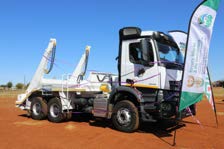
“To improve waste management in municipalities, the department is assisting in the development of their integrated waste management plans, and training on sustainable waste management practices,” says Minister Creecy.
Among the greatest threats to the health of the environment and people is waste pollution. “Throughout our country, we are plagued by littering, illegal dumpsites and the scourge of plastic waste that enters our river systems, our wetlands and ultimately our Oceans,” says Minister Creecy.
While the country has made significant strides in improving waste Management since 1994, almost a third of households still do not have regular weekly household waste removal services. Households are sometimes forced to find their own solutions to waste management …solutions that are often damaging to the health of communities and the well- being of the environment.
The National Waste Management Strategy was revised in 2020 and focuses on: improving household waste collection; diverting waste from landfills; promoting a circular economy and promoting community awareness of the effects of illegal dumping on their own health and on the environment.
“To achieve the goals of this strategy all of us must play our part: national and provincial government must support municipalities to develop local integrated waste management strategies. We must ensure our landfills comply with the regulatory environment and waste does not leach into ground water or into the soil. We must invest in the yellow fleet and every year we must ensure more and more homes have access to safe waste disposal,” says Minister Creecy.
Government has set up the regulatory environment for extended producer responsibility schemes to promote re-cycling in the packaging, electronics and lighting industries with recent regulations gazetted for new sectors such as used oil and pesticides.
The regulations for organic waste treatment, and organic waste composting, have also been published for implementation in order to divert waste away from landfills and create new industries.
“Communities must begin to separate their waste at home so that waste reclaimers can undertake their work in a dignified manner.
Households must teach family members not to litter and must work with their neighbours to prevent illegal dumpsites. All of us must participate in regular clean up campaigns to beautify our communities and protect our environment,” says Minister Creecy.
In addition, the Department has also co-operated with National Treasury and the Department of Cooperative Governance and Traditional Affairs (COGTA) to change the Municipal Infrastructure Grant Policy so that municipalities can access the grant to fund their yellow fleet.
“Government and the private sector must work with waste reclaimers so that we build a dignified waste, reclaiming industry that promotes waste diversion from landfills, promotes the circular economy and gives a decent livelihood to the tens of thousands of men and women who do the daily back-breaking work of the recycling industry,” urged Minister Creecy.
Popular influencer follows her dreams
Popular influencer follows her dreams LondekileShe developed her brand on social media and now relies on it for her livelihood.
This is Mbali Sebapu, who is among the young women who are known as influencers and have profited from the development of brand marketing by amassing a sizable fan base on their social media platforms and luring major brands to collaborate with them.
Sebapu (32) spoke with Vuk’uzenzele about her experiences using social networks to make money in order to inspire other young women who use them.
Sebapu from Soshanguve, in Pretoria, says she never imagined social media would evolve into a business rather than just a platform to connect with people and share interests.
When major brands called to partner with her in 2015, at the time of the rise of influencers, she established herself on social media.
Sebapu was employed by the military, serving in the SA Navy at the time, which she would later leave as her influencing career flourished.
Brands identify social media users who have a massive following to promote their products through social media posts and get paid for each post.
On Instagram, Sebapu is followed by more than 500 000 people.
“I developed a social media following by being genuine with my audience, and they embraced the real me.
“I managed to be a soldier and a pretty girl, so being in the navy also attracted my followers,“ she adds.
“On the weekends, I used to do my own thing, but during the week, I was at the military base in Bluff, Durban.“
According to Sebapu, after collaborating with several brands, she realised how powerful of an influencer she could be and launched her own company, Hermosa Flor Cosmetics.
She specialises in body care and beauty products, including make-up.
Sebapu says that after working for many years with a popular beauty brand, she opted to start her own. She went for make-up training and brand marketing courses, and with her sizeable following on social media, her business was able to take off. She opened Hermosa Flor Cosmetics at Menlyn Shopping Centre in Pretoria and also sells her products online.
She recently won a Top Beauty Brand Award and Africa’s most promising female business award. She quit the military in 2019 to concentrate on her business.
She warned other young women that they need to realise that they are creating a brand, not just a single campaign on social media.
“Your ability to earn money depends on having an audience. People follow you because you provide them with something of value, so be genuine and offer them helpful advice, ”she says.
Sebapu encouraged young women to grow their social media audience as a stepping stone for any business they may want to start.
Revamped hospital to improve service delivery
Revamped hospital to improve service delivery vuyelwanHuge improvement to the size and services of Mafube District Hospital in the Free State
Residents of Mafube Local Municipality in the Free State are set to receive improved healthcare services after Mafube District Hospital was refurbished.
Free State Premier Sefora Ntombela and Health MEC Montseng Tsiu recently opened and handed over the newly refurbished hospital, which is located in Frankfort in the Fezile Dabi District.
The hospital boasts emergency, casualty and outpatient services, maternity, paediatric, pharmaceutical, HIV/TB, oral health, reproductive health and mental health services. 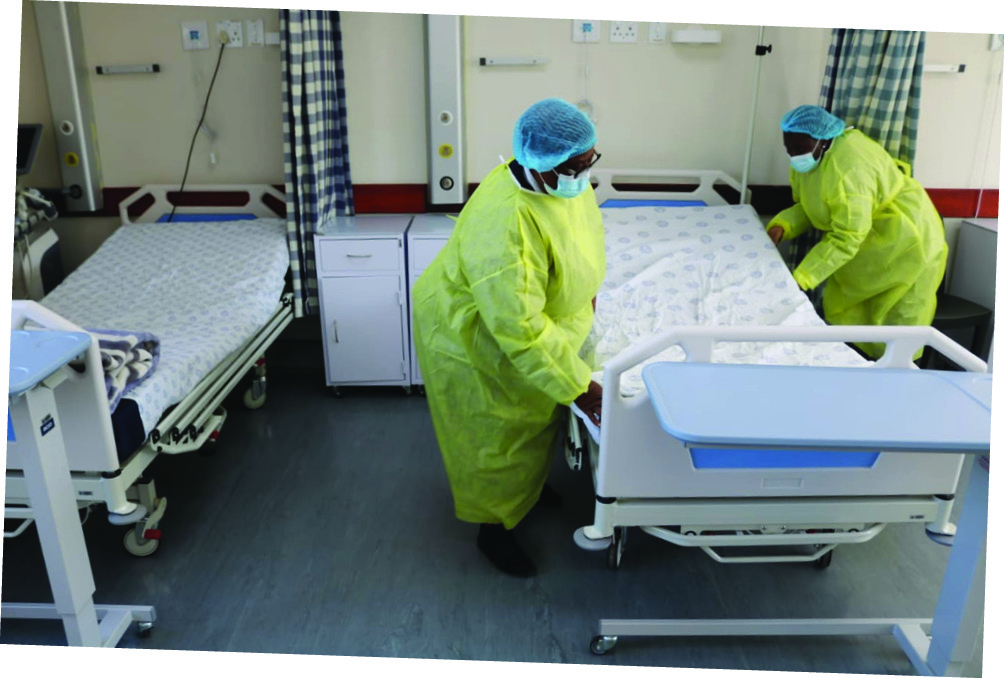
It also offers radiology, rehabilitation, social work, and operating theatre services.
The admissions office of the hospital has been extended and a new mortuary has also been built. In addition, seven patient buses were also handed over to the hospital.
The hospital’s acting chief executive, Sello Mofumane, says renovations of the hospital started in 2018 and the capacity of the facility has increased from 34 usable beds to 56.
“These include 22 beds in the general ward and two 72-hour assessment rooms, five beds in the paediatric ward and 29 beds in the maternity ward,” he says.
Mofumane added that there was an improvement as the hospital previously accommodated one child in a cubicle, and the casualty beds have increased from four to eight plus a resuscitation room.
“Our hospital receives referrals from eight primary healthcare facilities in the Mafube subdistrict, which comprises Frankfort, Tweeling, Villiers and Cornelia,” Mofumane says.
He encouraged the community to take good care of the newly renovated hospital and report any acts of criminality on the infrastructure to the police.
According to Mofumane, the hospital was established in 1944 after one of the first medical doctor’s in Frankfort, Dr Zuurdeeg, left a 1 000 pounds in his will for the hospital to be built.
“Miss Hester Muller of Tweeling was the first patient at the hospital and she is still alive,” he says.
The Dr Zuurdeeg Hospital was later renamed Frankfort Hospital, and post-1994 was again renamed Mafube District Hospital
Small business urged to apply for support
Small business urged to apply for support vuyelwanThe Minister of Small Business Development, Stella Ndabeni-Abrahams, has encouraged small businesses in townships and rural areas to apply for support through the Township and Rural Entrepreneurship Programme (TREP).
“We are deliberate in addressing unemployment and poverty, but we also have a responsibility to grow the economy,” Minister Ndabeni Abrahams said.
Addressing the SheTradesZA Youth Seminar held recently in Pretoria, the minister said the maximum value of TREP stands at R1 million, with one component being a grant and the other a loan. 
Township or rural-based entrepreneurs can apply for support, including funding, through the common application template from the Small Enterprise Development Agency (SEDA), the Small Enterprise Finance Agency (SEFA), the National Empowerment Fund (NEF) and the National Youth Development Agency (NYDA).
The Owners of the business must be South African nationals.
The following schemes are available for qualifying entrepreneurs:
- Small-scale bakeries and confectioneries support programme
- Autobody repairs and mechanics support programme (as well as small and independent autospares shops and informal automotive entrepreneurs)
- Butcheries support programme
- Clothing, leather and textiles support programme
- Personal care support programme
- Spaza-shop support programme
- Tshisanyama and cooked food support programme
Registration can be done on smmesa.gov.za/. and complete the information required.
In an effort to ensure the funding processes for small business is seamless and user-friendly, government is working toward merging entities for small businesses to form one agency.
“We are currently in the process of merging SEFA and SEDA as well as the Co-operative Banks Development Agency.”
SheTrades programme
Ndabeni-Abrahams said through various initiatives, government has assisted the small business sector to grow and create much-needed employment.
“The Department of Small Business Development and SEDA formed a partnership with the International Trade Centre (ITC), to bring the SheTrades programme to South Africa, and create a SheTradesZA hub.
“The programme aims to empower women-owned enterprises to trade locally, regionally and internationally. The hub supports strengthening the business skills and competitiveness of at least 10 000 South African female entrepreneurs over a four-year period,” the minister said.
Nearly 3 000 South African female entrepreneurs are already registered on the SheTradesZA Hub and receive free e-learning and capacity building.
The SheTradesZA Hub will also improve access to investment for women-owned enterprises and promote business opportunities.
“The department and SEDA’s involvement in the SheTradesZA Hub demonstrates our commitment to developing and ensuring economic empowerment of women in South Africa,” Minister Ndabeni-Abrahams said. – SAnews.gov.za
For more information about Seda call 0860 663 7867 email info@seda.org.za or log on to www.seda.org.za
South Africa's first female paratrooper
South Africa's first female paratrooper LondekileSapper Nomonde Nomtsheke (28) has become the first woman to qualify as a paratrooper in the South African Engineer Corps, a division of the South African National Defence Force (SANDF).
A paratrooper is a military parachutist who is trained to parachute during military operations and functions as part of an airborne force.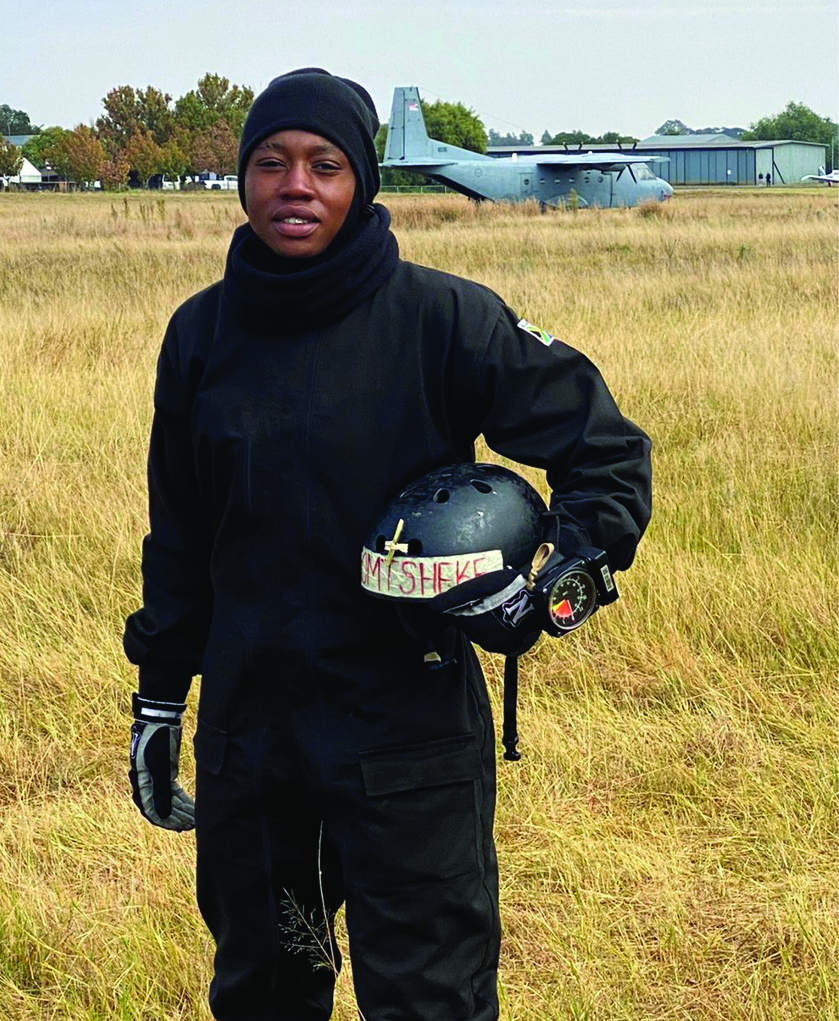
Nomtsheke, who is part of the School of Engineers, says being a paratrooper is a dream come true for her. The School of Engineers is part of the South African Army Engineer Formation, which provides combat engineering corps training and teaching to military officers and personnel throughout the SANDF. The school is based in Kroonstad, Free State.
“When you join the SANDF, you see many things you would like to do. Being a paratrooper was one of those for me because they test your fitness level, both physically and mentally, and your perseverance as a human being.”
Humble beginnings
Born in Mangaung, Free State, Nomtsheke was not initially interested in joining the SANDF, but wanted to become a soccer player after matric.
However, in 2016, when the opportunity arose to be part of the SANDF, she applied.
“For me, it was more about securing employment and being able to provide for my family. Unfortunately, by the time I received a callback I was in Taiwan for the World Student Games.”
When the opportunity arose again in 2020, she grabbed it with both hands.
“It is very rare to get the same opportunity twice.
I grabbed the opportunity and made the best of it. Military training is not a walk in the park, since you experience late nights and early mornings, but I wanted to give it my best shot.”
By the end of the gruelling nine-month basic military training at the SA Army Infantry School in Oudtshoorn, Western Cape, Nomtsheke’s determination paid off as she was named the best practical learner and best overall learner.
She proceeded to 2 Field Engineer Regiment in Bethlehem, where she underwent her SA Army Engineer Corps Training at the Junior Training Branch. This year, Nomtsheke applied for the paratrooper selection process at 44 Parachute Regiment in Bloemfontein, where she was afforded the golden opportunity to undergo the paratrooper course.
The paratrooper course comprises two phases. The first one is the Basic Static Line Course, a first jumping course that qualifies one to become a paratrooper in which a round parachute is used, and the second one is called Advanced Static Line, which qualifies one to be a fully-fledged paratrooper.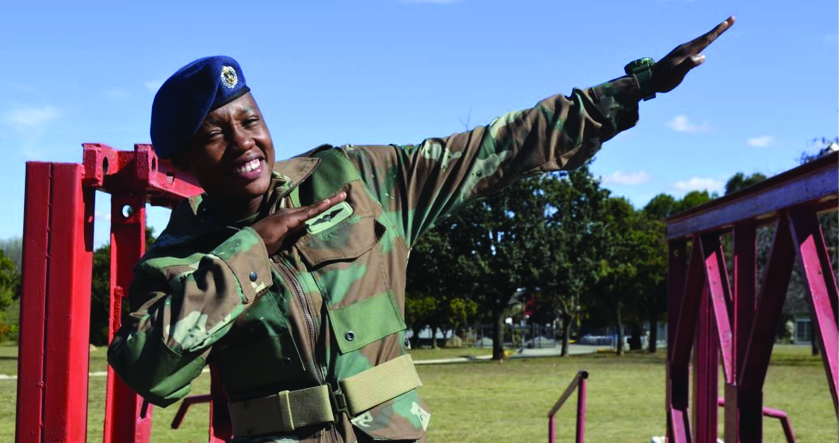
“Being part of the airborne family means I mainly work with the aircraft and the parachute. It is such an exhilarating experience. In the beginning, I used to get scared because it was risky, but I am now confident in my quality of training and I know that our instructors and colleagues take all the necessary precautions.”
The General Officer Commanding SA Army Engineer Formation, Brigadier General Charles Buyse, says Nomtsheke is the first female army engeneer to qualify as a paratrooper. She congratulated Nomtsheke following her achievement, which raised the Engineer Formation flag very high.
Women in the defence force
Nomtsheke says being the first in her field is indicative to young girls that anything is attainable if one puts their mind to it.
“It is very important that we have a significant number of women in the defence force, because right now it is dominated by men. The female touch is needed almost everywhere as women bring many good leadership skills. What is needed is support and room for them to prove themselves.”
Her message to women reaching for their dreams is: “Follow your heart. Be bold and trust yourself.”
Trees are our treasure!
Trees are our treasure! LondekileHistorically, South Africa did not have a culture of tree planting, and it was in the 1970s that a real need to promote tree planting was recognised. The concept of National Arbor Day ensued from the 1973 Green Heritage Campaign.
To date, the campaign has graduated to Arbor Month, which is a national campaign initi-ated to celebrate South Africa’s trees and to raise awareness about their importance.
How can you help to protect our indigenous forests?
Our forests are under threat from people who are careless with our heritage. Never cut down a tree in a natural forest and do not remove an animal or living plant without permission. Explain to others the importance of protecting our natural places.
Why must we plant trees?

Many places in South Africa are barren and lifeless because they do not have trees, gardens or plants. In the past, trees were not planted in township areas while suburbs have usually had trees growing for many years. We have to plant trees in every town, city and school in South Africa.
We need to plant a tree with every new home. We need to ensure that every clinic has trees. You can help by planting trees at home or working with your school, church, or local government to plant trees. Integrating fruit trees in your food garden can address household food security. Remember we are a water-scarce country, so use methods that conserve water to irrigate your trees.
Champion Trees Project
The purpose of the Champion Tree Project is to identify and protect trees that are of national importance and worthy of special protection, due to their remarkable size, age, aesthetic, cultural, historic or tourism value. Similar projects have been established in several other countries, but this is the first of its kind in Africa.
Nomination forms with guidelines for the nomination process are available from the DFFE. Every nomination cycle starts on 1 August each year, and ends on 31 July the following year.
The oldest planted tree in South Africa is a Saffron pear, brought from the Netherlands and planted in the Dutch East India Company’s gardens in Cape Town more than three centuries ago.
Trees and Climate Change
It is now well known that global climate is changing and that it is likely to continue changing for many years to come. Climate change brings about unusual weather, droughts, floods, melting of the permanent ice of the north and south poles, as well as rising ocean levels. All this is the result of air pollution caused by human activities.
One of the main pollutants responsible for this phenomenon is the greenhouse gas Carbon Dioxide (CO2). Greenhouse gasses have the ability to trap the sun’s heat in the atmosphere and so prevent the earth from cooling down
Green plants are a vital defence against climate change because they have the natural ability to remove CO2 from the atmosphere and store the carbon as biomass. Trees are especially valuable because they produce wood, in which large quantities of carbon is locked up for many years. To put this into perspective; one hectare of forest growing at the rate of producing 10m3 of wood per year will be removing carbon to the equivalent of 14 million m3 of air. One can visualise this as a column of air 1.4 km deep over an area of forest the size of two soccer fields.
Do keep in mind that trees do not all grow equally fast, and all forests are not equally productive as carbon sinks. Trees in urban environments and commercial forestry plantations are generally quite fast growing and are therefore active carbon sinks. Under favourable conditions some plantations can achieve average annual growth rates of 20m3 per hectare.
Forests and the Economy
According to Forestry South Africa, forestry is estimated to contribute about 150 000 jobs, predominantly in rural areas where there are high levels of unemployment. This translates to about 11.5% of job losses in the sector due to factors of production affecting profitability throughout the value chain. The contribution to the economy is estimated at R 45.5 billion. This translates to 7.7 % of Manufacturing GDP and 25.5% of Agricultural GDP, including Pulp and Paper. It is through commercial plantations that timber is produced for construction, mining, furniture, paper production and other beneficial timber related enterprises.
Turning waste into a fertile agribusiness
Turning waste into a fertile agribusiness vuyelwanThandiwe Mchunu is tapping into her background as a chemical engineer to turn food waste into compost for her emerging farm.
Born in the agriculturally vibrant village of Mahlongwa, near Umkomaas, in KwaZulu-Natal’s South Coast, Mchunu (38) says her decision to study chemicals was to help marginalised communities, particularly women, to produce food at a cheaper cost.
She believes that everything revolves around chemical engineering, just like agriculture.
With a solid foundation in growing crops that was laid by her late mother, Mchunu left her job in 2018 to work on her 22-hectare farm, which she leased from a local tribal authority. 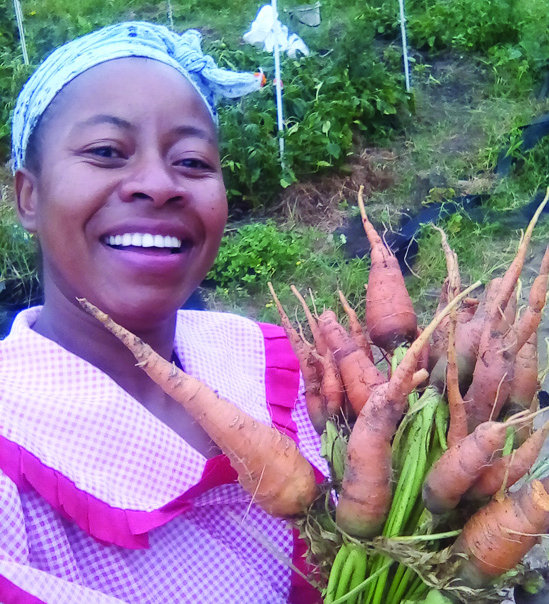
While working full-time, she discovered that the majority of industries produced waste that could be used to make compost, but instead that waste ended up at landfill sites. She wishes to use her expertise to make compost that would benefit many emerging farmers in her community.
She grows a variety of vegetables and sells them to the local supermarkets and community.
Her farm employs 10 people seasonally.
“I’m passionate about farming. It has followed me since I was a child and through my career. Wherever I go, I always make sure I have a pot plant to grow something. It fascinates me to watch a plant grow until harvest,” Mchunu says.
With sponsorship from the Council for Scientific and Industrial Research, Mchunu is pursuing a master’s degree in chemical engineering at the University of KwaZulu-Natal and is using her farming methods for her research.
While she currently produces a small amount of compost, her main objective is to work with food-processing businesses to bring large amounts of organic waste to her farm so she can use it to make compost through her waste management company, TMGG.
Mchunu says she wants to see more women giving back to their communities by launching projects to share knowledge as a way to honour the role of women in the nation.
"My long-term objective is to do agro-processing and inspire other women by demonstrating our strength."
She said manure, compost and animal feed were expensive farming expenses. "I want to address that issue by utilising food waste from various markets to produce compost and animal feed.”
We can and will do more to end load shedding
We can and will do more to end load shedding vuyelwanFrom The Union Buildings
Over the past few weeks, severe load shedding has disrupted our economy and caused extreme hardship for all South Africans.
Stage 6 load shedding was triggered by the loss of more than 18 000 megawatts (MW) of generation capacity due to unit breakdowns and an unprotected strike by Eskom workers.
After more than a decade of electricity shortages, South Africans are right to feel frustrated and angry. At times like this, it can feel like there is no end in sight.
Yet, while load shedding appears to worsen, the reality is that we have already taken several important actions to address the shortfall in electricity supply.
Our immediate priority is to stabilise the electricity system. As the system recovers and generation capacity is restored, Eskom will be able to reduce load shedding to lower stages. 
The agreement reached between Eskom and labour unions will enable critical repairs and return additional units to operation. The transmission line from Cahora Bassa in Mozambique has been restored, adding 600 MW to the grid, and Medupi Unit 6 returned to service recently adding another 720 MW. Additional units are expected to come back online, further easing the current shortfall.
At the same time, law enforcement agencies are working hard to tackle sabotage, theft and fraud at Eskom to address the threat that these criminal actions pose to the electricity system.
In the end, the bottom line is that we need to add more capacity to the grid. This will create space for Eskom to undertake critical maintenance and increase the reliability of its fleet. It will also create a buffer so that even if several units experience breakdowns at once, other sources can be used.
One of the first steps I took in 2018 was to revive the renewable energy procurement programme. In addition to the procurement of new generation capacity through this programme, the increase of the licensing threshold for new generation projects to 100 MW means that private investors do not require a license to build generation facilities up to this size. This simple reform has unlocked a massive potential pipeline of investment.
Eskom has made land available next to existing power stations for private investment in renewable energy projects. Design modifications have been completed to improve the performance of Medupi units 1, 2 and 3 and are underway in units 5 and 6.
While these actions are significant and will bear fruit over the coming months, they are clearly not enough to address the crisis that we face.
What the past few weeks have demonstrated is that we need to do more and do so with the utmost urgency.
There is no reason why a country like ours – with the skills, capabilities and resources we have at our disposal – should have to endure a shortage of electricity.
Over the past few weeks, we have been working with the relevant Ministers and senior officials on a range of additional measures to accelerate all efforts to increase our electricity supply. The message is clear: this is no time for business as usual. We need to act boldly to make load shedding a thing of the past.
While the measures we have already taken will secure the supply of reliable and affordable electricity into the future, we have been looking at what additional measures we can take now to bring that goal closer.
We will soon be completing the detailed work and consultations needed to finalise these further measures. We will then, soon, be able to announce a comprehensive set of actions to achieve much faster progress in tackling load shedding.
There are no easy solutions to our electricity crisis. But we are committed and determined to explore every avenue and use every opportunity to ensure that we generate enough electricity to meet the country’s needs.
Women urged to explore the chemicals sector
Women urged to explore the chemicals sector LondekileYoung women who are not yet sure which career path they want to follow should consider the chemicals sector, which offers various career fields.
This is according to the Chemical Industries Education and Training Authority (CHIETA), which facilitates skills development through various training initiatives in the chemical and manufacturing industries.
Lilitha Sobuza (23) from Khayelitsha in Cape Town, who is studying towards a National Diploma in Chemical Engineering, is one of the young women who have received funding and assistance from CHIETA.
“CHIETA ensured my placement at Fine Chemicals Corporation to complete my Work Integrated Learning (WIL) programme and has given me the great opportunity to start my career and develop my skills in the chemical sector,” she says.
Her interest in the sector was inspired by the opportunities available in various industries, such as food and beverages, pharmaceuticals and fuels.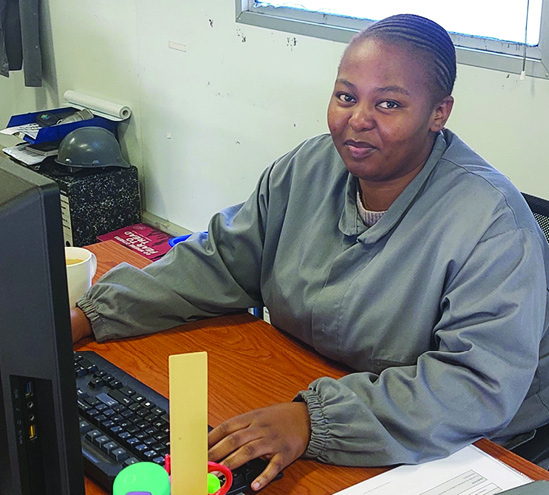
“The chemical sector develops products that make life easier for others. I wanted to be a part of this and knew it would provide numerous opportunities for me.”
This Women’s Month, Sobuza encourages women to explore and contribute to the sector.
“There are still more men than women in the sector, but having equal opportunities will ensure progress and development in society. Women have been contributing to the sector since the beginning of time and I strongly believe they should continue to do so,” she says.
Sobuza hopes to obtain an Advanced Diploma in Chemical Engineering and enter the pharmaceutical industry.
CHIETA is invested in youth-centre programmes, including learnerships, apprenticeships, WIL, bursaries, targeted skills and entrepreneurial development programmes. It also offers support for start-ups and SMMEs.
“Our new vision means we’ve adjusted our purpose to be broader than simply skills development and training. We’re now in the business of sustainable livelihoods,” says CHIETA CEO Yershen Pillay
Apply for assistance
All SETAs, including CHIETA, assist students to obtain their qualifications by providing financial support and connecting them with companies to get the practical experience they need to take advantage of work opportunities.
For more information about CHIETA and careers in the chemicals sector, visit www.chieta.org.za
Young innovator strikes gold with app
Young innovator strikes gold with app vuyelwanKutlwano Tshatiwa (17), is taking the South African technology scene by storm with his revolutionary phone application that can help to diagnose pneumonia and skin cancer in a matter of seconds.
Tshatiwa is a matric learner from Gabonewe High School in the North West.
Tshatiwa recently won a gold medal at the International Festival of Engineering Science and Technology that was held in Tunisia. His application ranked in the top 10 projects in the world.
Tshatiwa says he was inspired to develop the application at the height of the COVID-19 pandemic to help potential cancer and pneumonia patients get the treatment speedily. 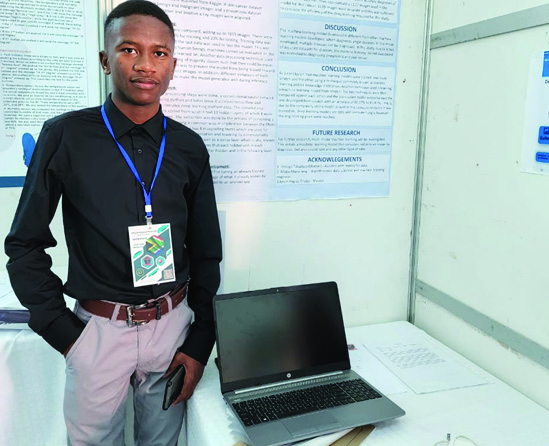
“When COVID-19 was really bad, I saw a lot of cases where late diagnosis led to delayed treatment, reducing their chances of survival.
"With an application that gives you a diagnosis within seconds or milliseconds, you can start taking treatment much earlier.”
The app runs on Android smartphones. To diagnose pneumonia, one simply uploads an X-ray image [of their chest] and the application produces either a negative or positive diagnosis.
“With regard to skin cancer, the user just uploads an image of their skin and the application will give a diagnosis and also give a scale of what confidence it has,” he says.
Tshatiwa started designing applications when he was 13 years old. “I learned from the internet by watching videos and reading blog posts.”
Tshatiwa says he began the project hoping to make money. “As time went by, the money part just went out the window and only the love for creating and coding remains,” he says.
Tshatiwa and his application came to prominence through the Eskom Expo for Young Scientists, which aims to encourage young South Africans to participate in Science, Technology, Engineering, Mathematics and Innovation at schools and vocational and technical and vocational education and training colleges.
Eskom’s Development Foundation Chief Executive Officer, Cecil Ramonotsi, says the power utility is committed to nurturing the country’s future scientists and innovators.
“Eskom is proud to be the funder of the Eskom Expo for Young Scientists, a platform which continues to enable learners not only to develop themselves but to also make a positive contribution to the country through scientific knowledge,” says Ramonotsi.
For more information about the Eskom Expo for Young Scientists call 011 894 1365 or visit www.exposcience.co.za
Young researcher ploughs back
Young researcher ploughs back LondekileResearcher and academic, Thuli Khanyile (34) from Durban in KwaZulu-Natal is proud to be contributing to the fight against HIV/AIDS in South Africa and promoting innovation among young learners.
She holds a B-Tech degree in Biotechnology from the Tshwane University of Technology and did her in-service training at the Council for Scientific and Industrial Research in 2011, which is where she was introduced to HIV research.
She holds a Masters of Science Degree in Medicine, specialising in molecular medicine and haematology from the University of Witwatersrand, and is currently a lecturer and a PhD candidate at the same institution.
Her research investigates different DNA strategies for the development of HIV vaccines.
“Initially, I wanted to become a medical doctor but I was intrigued by the behind-the-scenes work of medicine. So, I decided to become a researcher instead. I want to contribute to the field of HIV drug discovery,” says Khanyile.
She encourages young people to consider careers in research and problem-solving.
“They should be encouraged to come up with solutions to challenges facing the country. The first step is to study towards Science, Technology, Engineering and Mathematics (STEM) while in high school because that is what is required to study for a qualification in Biotechnology,” she says.
Nka'Thuto Edu Propeller
In April 2016, Khanyile, together with Thandeka Mhlanga (32), established Nka’Thuto Edu Propeller, a non-profit organisation that seeks to advance innovation, science and creativity in previously disadvantaged communities, one student at a time.
“We task young people to use STEM principles that they know and understand to solve problems they see in society,” says Khanyile.
Unfortunately, due to the impact of COVID-19 on businesses, Nka’Thuto Edu Propeller lost its primary funder but the Department of Science and Innovation stepped in to help.
Her message to women and young girls this Women’s Month is that women are capable of doing anything.
“In the future, we are going to see more women taking leadership positions because of their are empathic and nurturing coupled with their technical skills. For me, that makes you, as a woman and as a girl, a force to be reckoned with,” says Khanyile.
For more information, you can contact Nka’Thuto Edu Propeller on their website at https://www.nkathutoedu.org.za or call them on 010 534 6454
